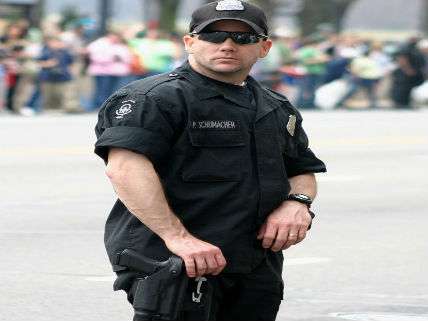Gun Rights Groups in California Sue to Take Away Some Gun Rights from "Retired Peace Officers"
Exemption for former police and other types of government officials in Gun-Free School Zone Act violates equal protection of the law for other licensed gun carriers, suit argues.
Former cops often get special treatment when it comes to laws that restrict the free possession and carrying of weapons. A lawsuit, Garcia v. Beccera, now at the Ninth Circuit Court of Appeals, is trying to change that in California when it comes to gun-free school zones.

Eleven Californians, teamed up with four gun rights organizations, are behind the suit, and they filed their opening brief this week at the Ninth Circuit after losing in August 2016 in a federal District Court.
The law that roused the plaintiff's ire is the California Gun-Free School Zone Act of 1995, as amended in 2015 by SB 707. The original law added special penalties against those with a gun in a school zone if they had no legal authority to carry a gun at all, but did not affect legally licensed carriers.
The 2015 change generally barred even licensed holders from having a gun in a school zone, but carved out a special exception for "honorably retired peace officers" with carry licenses. (That doesn't just mean what you might expect, municipal or county police officers, but also retired Fish and Game code enforcers, Department of Parks and Recreation or Forestry and Fire Protection agents who enforce the Public Resources Code, and former marshals "appointed by the Board of Directors of the California Exposition and State Fair" and "any honorably retired federal officer or agent of any federal law enforcement agency" (even if their actual job never involved carrying a gun).
The plaintiffs believe that special treatment violates their 14th Amendment rights to equal protection under the law. The District Court in August disagreed and granted the state a motion to, as this week's brief explains, "dismiss with prejudice, holding that although appellants and retired peace officers are similarly situated, the law survived rational basis scrutiny because it was rationally related to protect the safety of retired peace officers."
The plaintiffs disagree, as explained in the brief. The argument is basically that there is no rational basis to distinguish a lawfully licensed carry permit holder in California (getting one of those is often very difficult indeed, varying by specific local jurisdiction) and a "retired peace officer" relevant to the purposes of the law:
Indeed, arming one class of civilians over a similarly-situated class of civilians actively undermines the purpose of the Act, which is to eliminate access to guns on school grounds by anyone who is not (1) authorized to perform law enforcement activities or (2) granted approval to carry by the relevant school administrator.
While the District Court concluded, as summed up in the plaintiffs' brief, that "the distinction [between retired peace officers and other license holders] poses no Equal Protection concern so long as it rationally relates to any state interest [in this case, an interest in the safety of retired peace officers], even if that interest is inconsistent with the purpose of the law in which it appears," the plaintiffs disagree.
An emailed press release from the Firearms Policy Coalition (FPC), one of the four civil rights groups pursuing the case (along with the Firearms Policy Foundation, the CalGuns Foundation, and the Madison Society Foundation), explains the history of the 2015 law change:
The case…was filed after California enacted Senate Bill 707 (SB 707) in 2015, which was originally written to remove all civilian exemptions to the Gun-Free School Zone Act—including those for both retired "peace officers" and CCW licensees—but was later amended to re-include the exemption for retirees following significant lobbying by law enforcement associations and government employee special interest groups.
Craig DeLuz, an individual plaintiff in the case and a spokesperson for Firearms Policy Coalition, believes this case is about justice and equality. "As both a parent and a school board member, I believe it's important that our children see that the justice system does not allow the government to play favorites," DeLuz said.
The plaintiffs have some solid precedent in the Ninth Circuit that should make the case more likely to go their way, as the FPC sums up in their press release: Silveira v. Lockyer, a 2002 case based on a (failed) challenge to California's assault weapon ban, in which (among other issues) the Ninth Circuit decided that the "retired officers exception [to the Assault Weapons Control Act] arbitrarily and unreasonably affords a privilege to one group of individuals that is denied to others."
They plaintiffs' brief thus insists that the exemption in existing law is blatantly "for the improper purpose of favoring a politically powerful group and to disfavor a politically unpopular one."
The citizen plaintiff the case is named after, Ulises Garcia M.D., "obtained a carry license to protect himself and his family in response to multiple threats of violence from a former patient" according to the brief.
It may seem curious that gun rights groups should be fighting to extend a prohibition on gun carrying further than existing law. A victory in this case will not, after all, give Garcia or the other citizen plaintiffs their right to carry in school zones if they wish; it will merely take it away from retired peace officers who currently have it.
A clue as to the suing organizations' intention can be found on the website the Firearms Policy Foundation has established regarding the case: they hope victory in this suit will "help us ensure that anti-gun government union lobbyists think twice before supporting gun control bills and cutting shady back-room deals."
That is, by not allowing government agents to get around gun laws, perhaps they will be less inclined to politically support such restrictions in the future.


Show Comments (33)